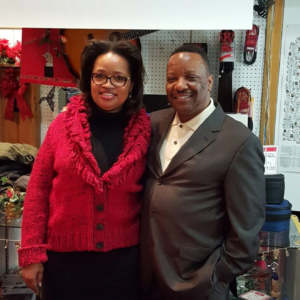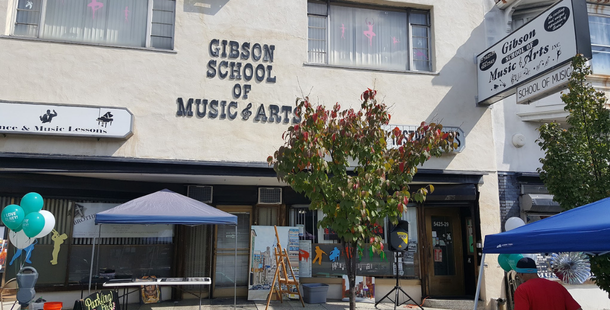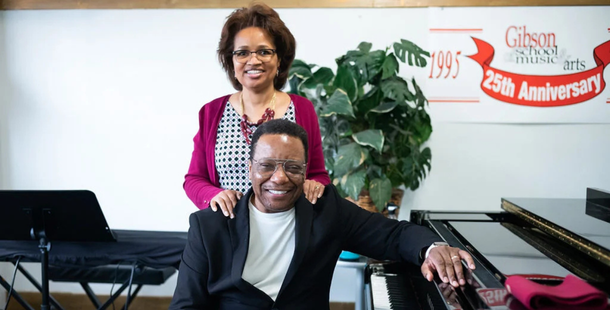Back

Blog
Three Decades of Music and Momentum: How Gibson Music and Arts Keeps Evolving
By ICIC | June 23, 2025

In the heart of Philadelphia’s Olney neighborhood, tucked inside a 12,000-square-foot building that once housed the iconic Zapf Music School, you’ll find a place alive with rhythm, creativity, and resilience. Gibson School of Music and Arts is far more than a music school—it’s a community hub, a cultural institution, and a family legacy built on a foundation of passion and perseverance.
Wilhemina Gibson and her husband, Professor Randy J. Gibson, a U.S. military veteran, co-lead the business as Executive Director and Artistic Director, respectively. Together, they’ve nurtured a musical home for nearly 20,000 students, having grown the business from a small neighborhood music school into a multifaceted center for education, retail, and performance. Their alumni have gone on to win Grammy, Tony, Emmy, and Stella awards—names like Jazmine Sullivan and Kamal Gray of The Roots got their start here.
“We’ve had to be nimble and creative to keep up with the times,” Wilhemina says. “Innovation isn’t just important; it’s how we’ve stayed in business all these years.”
Built on a Dream, Grown with Purpose
Founded in 1995 after Professor Gibson purchased the Zapf Music School, Gibson Music and Arts began as a bold vision: to create a music conservatory that would reflect the diversity, artistry, and aspirations of the surrounding community. That vision expanded to include a music retail store, concert hall, art and animation programming, and eventually an online learning platform.

This year marks a major milestone—Gibson Music and Arts is celebrating 30 years in business. It reflects the power of persistence, adaptability, and a deep connection to community.
From day one, the Gibsons made it their mission to “channel and excite expression in children and adults, providing a nurturing and safe environment.” That mission has translated into life-changing experiences for students of all ages and backgrounds.
“Some of our students have gone on to become professionals in the industry,” Wilhemina shares proudly. “But beyond the awards, we’re just as proud of the young people who’ve used what they learned here to build confidence, pursue education, and give back to their communities.”
Learning to Scale and Thrive with the ICCC program
Wilhemina first connected with ICIC through its ICCC program, an executive education initiative that supports small businesses with capital readiness and capacity-building tools. While she doesn’t recall the exact cohort year—”many years ago,” she says with a smile—the impact still resonates.
“I learned a lot about finance, marketing, and how to scale a business,” she explains. “That kind of knowledge makes all the difference, especially when you’re trying to grow and you’re wearing a hundred hats.”
The program equips businesses in under-resourced communities with the strategies and connections they need to grow sustainably. For the Gibsons, it came at the right time. The insights they gained helped them formalize operations, explore new revenue streams, and prepare for growth.
Innovation as a Survival Strategy
For Gibson Music and Arts, innovation hasn’t just been a business value—it’s been a lifeline.
“When the economy shifted in 2018, we realized we had to do more than just teach music,” Wilhemina recalls. “So we expanded by adding a full retail store, a concert hall, and practice room rentals. That pivot helped us stay afloat.”

When the COVID-19 pandemic hit, they faced another steep challenge. Like many small businesses, they were forced to close for six months. During that time, they relied on federal support like PPP and EIDL loans and used the pause as an opportunity to innovate again—this time by launching online music lessons and setting up an e-commerce platform to sell instruments and accessories.
“We weren’t sure how it would go,” Wilhemina admits. “But we just kept asking: What do our students need? How can we keep serving them, even if they can’t walk through our doors?”
Looking Ahead to the Next Chapter
Today, Gibson Music and Arts remains deeply connected to the community it serves. With a multicultural student base and a building full of activity—from rehearsals to art exhibitions to community events—it stands as a vibrant example of how small businesses can be a force for inclusive economic development.

Looking ahead, their goals are ambitious: expand student enrollment to 450, boost retail sales by 50%, and increase concert hall and practice room rentals by 40% in the next five years. Innovation will be key to reaching those goals, and the Gibsons are ready. “We’re always asking ourselves how we can do better—how we can be more responsive to what our community needs,” Wilhemina says.
Words of Wisdom for Fellow Entrepreneurs
Wilhemina’s advice to other small business owners? Embrace change.
“Don’t be afraid to pivot. The market’s going to shift, and you’ve got to shift with it. Flexibility is everything.”
For 30 years, Gibson Music and Arts has embodied that spirit, showing how small businesses, especially those rooted in under-resourced communities, can grow, innovate, and lead with heart.
About ICIC’s ICCC Program
ICCC is a 40-hour “mini-MBA” designed for established small business owners who want to lead, grow, and innovate in today’s fast-moving world. The ICCC program brings together executive education, networking, one-on-one coaching, and access to capital—empowering small businesses in under-resourced communities to break barriers, build stronger companies, and drive community impact. This expert-designed curriculum is offered at no cost to qualifying businesses, thanks to ICIC’s funding partners.
To learn more and apply visit icic.org/iccc.
